13+ Sample Music License Agreement
-
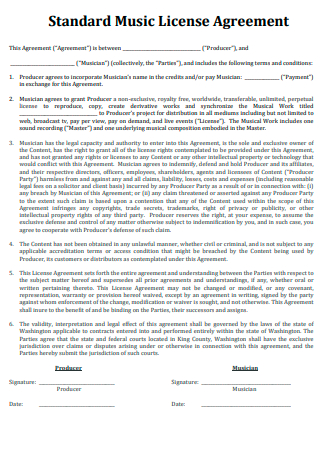
Standard Music License Agreement
download now -
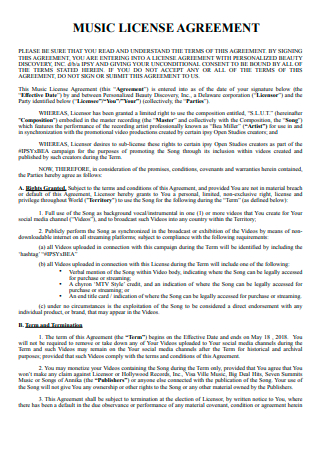
Music License Agreement Example
download now -
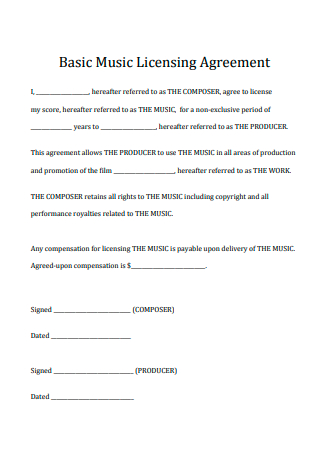
Basic Music Licensing Agreement
download now -
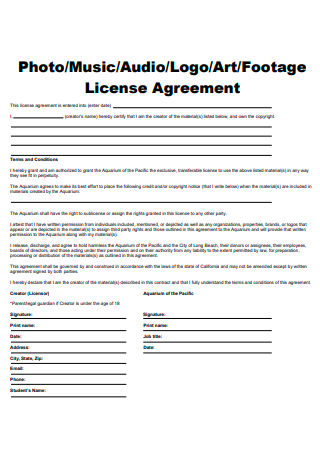
Music License Agreement in PDF
download now -
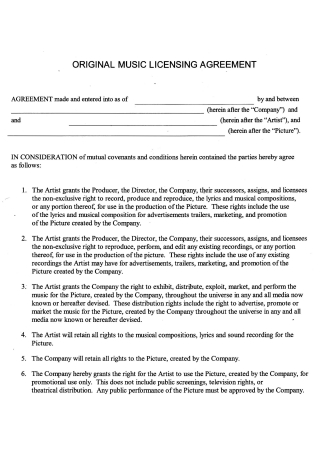
Original Music Licensing Agreement
download now -
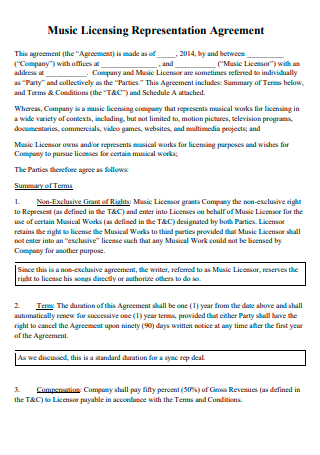
Music Licensing Representation Agreement
download now -
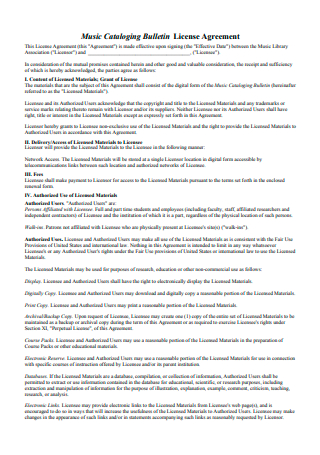
Formal Music License Agreement
download now -
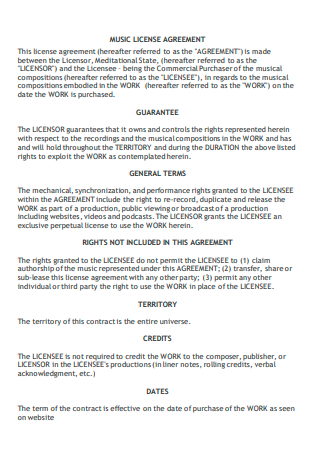
Printable Music License Agreement
download now -
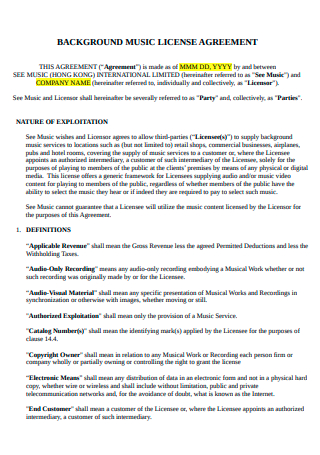
Background Music License Agreement
download now -
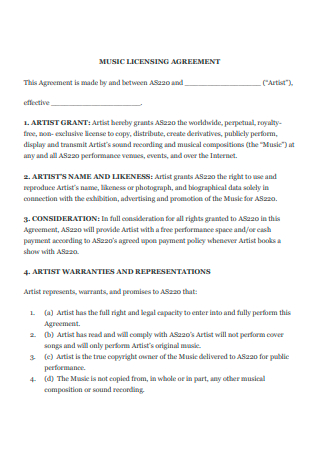
Music Licensing Agreement Format
download now -
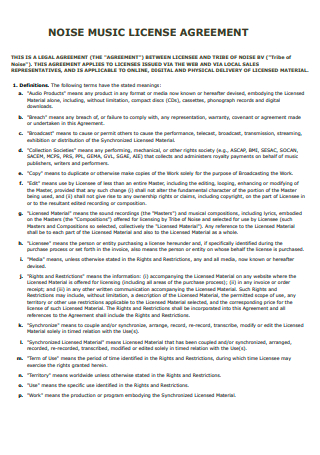
Noise Music License Agreement
download now -
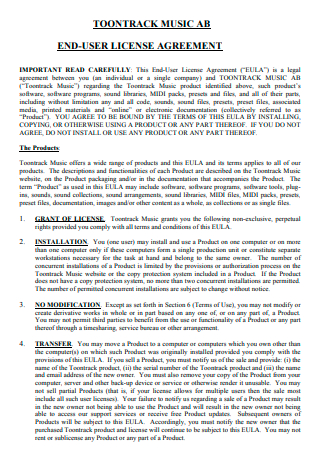
Music End User License Agreement
download now -
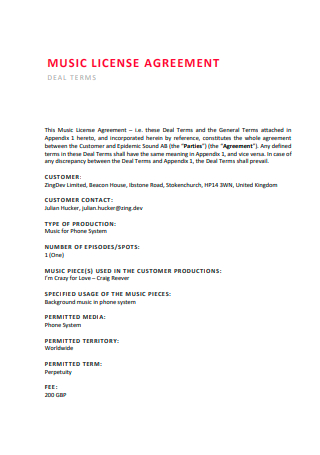
Simple Music License Agreement
download now -
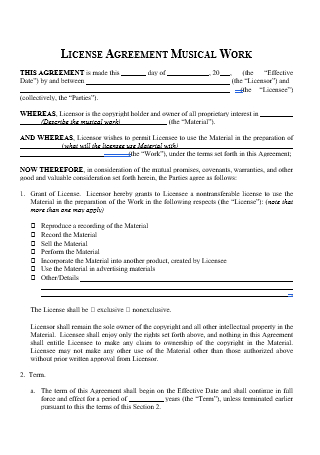
Musical Work License Agreement
download now
FREE Music License Agreement s to Download
13+ Sample Music License Agreement
What Is a Music License Agreement?
Types of Music Licenses
Components of a Music License Agreement
How To Get Music Rights
FAQs
What is a copyright license agreement?
What are the three Ps of licensing?
How are licensors getting paid for licenses?
What Is a Music License Agreement?
A music license agreement is a binding contract that protects the rights of a musician and guarantees that all their work is under copyright. A copyright provision is necessary to protect the owner of the intellectual property. The agreement covers the owner offering exclusive authority to entities and corporations to reproduce and distribute their work in exchange for royalties. Music copyright works the same as other copyright arrangements. It is also up to the individual musician or music owner to decide the organization responsible for reproductions of their work while earning revenue. The agreement is between the creating entity or the licensor and the entity seeking to use or the licensee. A music license agreement is present when using original music for television, films, advertisements, and other promotions.
According to an article published on the website of How Stuff Works entitled How Music Licensing Works, music in a low-end tv show estimates at two thousand US dollars for a five-year licensing deal. For a film, it escalates to a ten thousand US dollar perpetuity. Popular songs are in the range of three thousand dollars for television and 25 thousand for film use. Using music in commercials costs more money, typically ranging from 25 to 500 thousand US dollars annually.
Types of Music Licenses
Music licenses are one of many ways that musicians or artists gain revenue or royalties for their work. It allows them to give another entity legal permission to distribute their music in any form of media. Generally, music licenses have six different types or classifications for various purposes. An original score of music work ranges from sheet music reproduction, theater productions, Broadway musicals, jukeboxes, major motion pictures, and big-scale movies. Below are the six principal forms of music licenses present in the industry, together with their usage.
Components of a Music License Agreement
Music licensing agreements vary in content depending on the type of license you are getting. An artist or musician must be aware of all the different components that affect the song rights and the value of these rights. Below are the common elements that must be present in the music license agreement.
How To Get Music Rights
If an individual wants to use music for a film, video, commercial, advertisement, or other audiovisual projects, there is a need to acquire music rights. It can become a complicated journey to obtain these rights. However, following the steps below can help you get the music rights you need.
Step 1: Figure Out What Rights You Need for the Agreement
There are various types of music license agreements available that serve different purposes. The licenses give different rights to the licensee, and it is imperative to know them. If you are aiming for a film, it is best to use a sync and master license agreement.
Step 2: Determine if the Music Is in a Public Domain
For individuals in the United States, published musical works dating before 1922 are within a public domain. In other countries, music enters the public domain, elapsing the death of a musician at 70 years. If the music is within the public domain without a specific owner, recording and performing the song without a license is allowable. It is advantageous to research the origins of a song before use.
Step 3: Identify the Permission You Need For the Song
If you are aiming for a sync license, the permission comes from the copyright owner or publisher. For a master use license, identify the entity holding the ownership of the particular song you need. It is also advisable to contact the PROs, as they can help redirect you to the publishers or labels you need to seek permission for the songs.
Step 4: Contact the Associated Owners
After identifying the individuals or entities you need to seek permission from, the next step is to contact them. Writing a simple letter is a personal approach and proves to be more effective when requesting consent to use a song for free. In the case of multiple publishers, you must request permission from each one.
Step 5: Describe the Intention for Use
The music owner will want to know your intention for using their music. As a licensee, you have to prepare a project description or project plan for the owner. The plan must include the story plot for a film or tv show, project budget, project exhibitions, and other necessary inclusions.
Step 6: Negotiate for the Price
Finally, make arrangements for price negotiations. An owner sets fees according to the song and the intention of use. You also have the opportunity to try and negotiate with the payment that fits your intended budget.
FAQs
What is a copyright license agreement?
A copyright license agreement is a written contract between a copyright owner and another party. In its content, it allows an entity to use copyrighted materials that serve the intended purpose. These intentions can be printing or distribution within a specific timeline.
What are the three Ps of licensing?
The three P’s of licensing refers to profit, promotion, and protection. Profit refers to determining the price points to establish a profit margin. Promotion describes the process of training staff and conducting effective promotional plans to generate higher sales. Protection identifies copyright and trademarks claims relating to a product or service.
How are licensors getting paid for licenses?
Licensors get their pay through generating royalties for the reproduction and sale of their intellectual property.
Creating music is more than producing sounds and tones. A musician makes music intending to relay their emotions and message to listeners. However, for starting or small-time musicians, it becomes challenging to reach a broader market with limited resources. In these instances, a musician can draft a music license agreement to share their music. Start a journey to spread the message while gaining royalties through the music license agreements available for use and download above.
